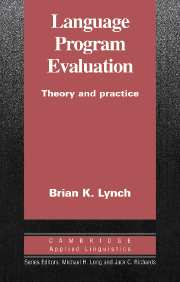Book contents
- Frontmatter
- Contents
- Series editors' preface
- Preface
- 1 Introduction
- 2 Historical background
- 3 Validity
- 4 Positivistic designs
- 5 Naturalistic designs
- 6 Quantitative data gathering and analysis
- 7 Qualitative data gathering and analysis
- 8 Combining positivistic and naturalistic program evaluation
- 9 Conclusions
- References
- Author index
- Subject index
3 - Validity
Published online by Cambridge University Press: 05 October 2012
- Frontmatter
- Contents
- Series editors' preface
- Preface
- 1 Introduction
- 2 Historical background
- 3 Validity
- 4 Positivistic designs
- 5 Naturalistic designs
- 6 Quantitative data gathering and analysis
- 7 Qualitative data gathering and analysis
- 8 Combining positivistic and naturalistic program evaluation
- 9 Conclusions
- References
- Author index
- Subject index
Summary
In Chapter 2, validity was referred to as “the notion of how we establish the veracity of our findings” and was linked to the task of determining “what counts as evidence” in the evaluation of language education programs. In this chapter, the concept of validity is developed along both theoretical (What is it?) and practical (How do I know when I have it?) lines. As mentioned previously, this will also involve an elaboration of aspects of the paradigm dialog. That is, to the extent that a determination of what counts as evidence differs from one research paradigm to another, the concept of validity is formulated differently, depending on the paradigmatic perspective chosen.
The first section of this chapter presents validity from the positivistic perspective. I first use Cook and Campbell's (1979) typology and discuss the classic threats to validity. Then I present other conceptualizations of validity from an essentially positivistic perspective. After that, I consider validity from the naturalistic perspective, offering various criteria and techniques for enhancing and assessing those criteria.
Validity from the positivistic perspective
It should be reiterated that the use of the term positivistic is meant as a general label for a variety of current stances in relation to the philosophy of science. It should also be pointed out that although there are few, if any, who would refer to themselves as positivists or logical positivists these days, the philosophical assumptions of logical positivism continue to provide the rational basis for what counts as evidence in most scientific inquiry (Bechtel 1988).
- Type
- Chapter
- Information
- Language Program EvaluationTheory and Practice, pp. 41 - 69Publisher: Cambridge University PressPrint publication year: 1995

